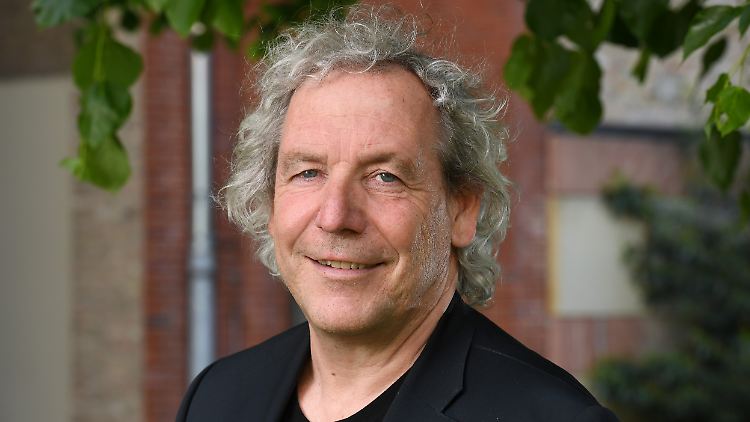Local and long-distance transport is becoming increasingly unattractive. Nothing will happen again at Deutsche Bahn and Lufthansa in the next few days. Mobility researcher Andreas Knie talks to ntv.de about the absurdity of the strike actions, failures in the transport turnaround and the fatal blockade attitude of GDL boss Weselsky.
ntv.de: People are annoyed. Local public transport, the trains, Lufthansa, there are repeated strikes everywhere. What does this mean for the transport transition? Will everyone be driving on the road again soon?
Andreas Knie: These are very difficult times for the transport transition. In particular the train, which is an alternative means of transport, has proven to be extremely unreliable. This is fatal because many people had reoriented themselves after the peak of the pandemic and the lockdowns. Trains and buses were well on their way to reaching pre-Corona numbers again. The strike action is brutally slowing down this trend.
From Thursday, railway employees, among others, will be on strike again. There is now a lot of criticism of GDL boss Weselsky. Is the traffic chaos he is causing at Deutsche Bahn still effective?
Despite all the criticism of the strike activities, it must be noted that the right to strike is a fundamental right in Germany. We really have some catching up to do in the lower wage groups for buses and trains. At the same time, we also know that Deutsche Bahn pays very generous wages in the higher levels of the hierarchy. This is Claus Weselsky’s moral arsenal. However, collective bargaining requires a willingness to compromise. And I don’t see that from either partner, even though they’ve been negotiating for months now. They take the passengers hostage because they can. The scandal is that the leading heads of the negotiating commission themselves are not affected in the slightest because they don’t travel by train, but with company cars and chauffeurs.
Does that mean the stranded passengers or travelers will no longer endure the traffic chaos for a good cause?
No, they would have if an agreement had been reached in January or February. For a union, strike must be the last resort to press its case. But then it’s over, then there has to be an agreement. Apparently it works At the railway it’s about completely different things: personal vanity and an addiction to profile, for example. That’s why people lack any acceptance of the rail strike. This doesn’t help the traffic transition at all.
On the other hand: If the demands of the employees are met, the jobs also become more attractive. That would advance the transport transition, wouldn’t it?
Creating attractive employment relationships is of course important. We need good conditions in the lower wage structures so that people want to work there. It is the basic prerequisite for a transport transition to really work. This applies to both bus and train passengers in local transport. Good quality cannot be achieved permanently on the backs of struggling employees. Wages and working hours need to be improved. That just takes too long. People are losing faith in trains and public transport.
Not only the GDL, but also Verdi is calling on Lufthansa employees to go on a warning strike on Thursday and Friday. Flying is therefore not an alternative on these days. Is simultaneous strikes and paralyzing as much of the country’s infrastructure as possible the new trend?
I don’t think that was strategically wanted by the unions. We currently have a certain culture of riots. Everyone wants to draw massive attention to their own interests. The means of transport that are supposed to be an alternative to the car are being restricted. The absurdity is that Fridays for Future, who want to make good politics together with Verdi, manage to make the car the big winner. Actually, everyone wants a turnaround in transport. From a union perspective, this is unfortunate. I would have liked smarter timing.
Are the warning strikes at Lufthansa justified?
In the past, Lufthansa has paid a lot of attention to its flying staff. None of them can complain anymore. But on the ground, in the handling services or on the apron, the working conditions are still precarious. The strike is therefore justified, and it will not be the last. By the way, cheap flight tickets only exist because parts of the economy or the value chain, namely those who provide the invisible services on the ground, are simply not paid well. You should always be clear about this.
Local public transport (ÖPNV) also went on strike at the same time as the trains. Are the problems similar here?
The public transport companies also pay too poorly and the working conditions are too unattractive. The service is brutal and the flexibility is low. Local and long-distance transport also have something in common: both drive through the area with a gigantic administrative head of water that is lavishly paid. In this respect, it is the bus drivers’ right to demand their share now.
Demographics have one advantage: they can be easily predicted. WAs the baby boomers retire, the workforce shortage will become even greater than it already is. The burden on employees will increase. Shouldn’t we have already taken appropriate precautions?

Andreas Knie is a social scientist at the Berlin Science Center for Social Research and professor of sociology at the TU Berlin.
(Photo: David Ausserhofer)
Germany is lying to itself when it comes to wage structure and labor shortages. We will only maintain our prosperity if we consistently define ourselves as a country of immigration. So far we have only opened small loopholes. However, it is still difficult or impossible to become naturalized in this country as a non-EU citizen. We have to change that. That’s one thing. And the other thing is that when it came to the transport transition, we always said like a mantra that the backbone was local public transport. However, without looking at him more closely. This is a huge association that eats up half of the money without being productive. Reforms are needed here in order to have money for productive services.
Some experts are already predicting that the strikes that wWhat we are currently seeing is just the beginning. Isn’t the transport transition coming to an end soon?
We have lived in an ideal world for the last 20 years. We often had tough collective bargaining disputes in the past. The fight for the 35-hour week, for example, was tough. We also saw things like general strikes back then. What we are currently experiencing is just starting to get rougher. Basically, reasonable working conditions are crucial. But the structure of local transport has to be right and it’s not doing that right now. What we also urgently need is a will to reach agreement and here Mr. Weselsky is personally blocking it.
Have we made any progress at all in recent years?
Actually, we’re just starting to really think about it. Four or five years ago, no one was discussing too many cars. We have now come to the realization that parked cars, which are in public spaces exclusively for car owners, must disappear. I’m optimistic. I believe that we are on the right track. But it just takes time. It’s a bit like a ketchup bottle. At the beginning only a little comes out. But there will be much more to come later.
Diana Dittmer spoke to Andreas Knie
